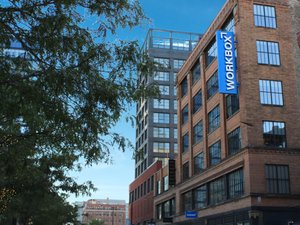The coliving trend has officially hit Chicago.
New York City-based startup Common just expanded to Chicago, opening a coliving apartment building in West Town near the intersection of Chicago and Damen. Unlike typical apartments, Common's members (the startup's word for tenants) pay a monthly rent that covers all utilities, cleaning supplies, and furniture, and enjoy perks that go beyond the usual apartment building amenities, including a community manager who plans events and the option to move to another home within the Common network.
"We like to say that people come for the convenience, but stay for the community," said Common founder and CEO Brad Hargreaves, who also cofounded General Assembly.
It's the first in a series of at least three coliving homes the startup will open in Chicago, and comes at a time when several startups and developers, including WeWork, are jumping in the coliving space.
Common Damen, as the apartment building is called, will rent 12 bedrooms ranging from $1225 to $1675 per month. There are three living floors that each have four bedroom apartment "suites" with a kitchen, living room, and front and back porches. Three bedrooms share one bathroom, and a fourth larger room has its own bathroom for a premium price. All the members have access to a basement level shared space and a roof deck with sweeping views of the Chicago skyline. Leases range from three to 12 months, and Common will lease and manage the 6,050 square-foot building in partnership with David Herrera of the Golden Mean Group.
Coliving offers additional perks that go beyond a typical apartment: All furniture, linens, cleaning supplies, kitchenware and utilities are included with the rent. There's a full-time community manager who facilitates events and outings. Members communicate with their roommates and the larger Common community via internal Slack channels.
![Common Damen -Bathroom_23 high[1]](https://media.bizj.us//view/img/11750912/common-damen-bathroom-23-high1*540.jpg)
![Common Damen_96 high[1]](https://media.bizj.us//view/img/11750916/common-damen-96-high1*540.jpg)
![Common_Damen_Living_Room_07 high[1]](https://media.bizj.us//view/img/11727809/common-damen-living-room-07-high1*540.jpg)
Members fill out an application, undergo a background check and financial check, and go through a short interview process, then the apartments are filled first-come, first-serve. Once members join the Common community, it can translate to housing opportunities across high-demand urban markets: Members sign an agreement with Common, rather than a specific location, which allows them to bounce around to different houses with shorter leases (as low as three months), or move to a Common home in a new city or a different part of the city if they get a new job elsewhere.
"We really wanted to create a company that solved a lot of those [apartment] issues in a fullstack way," Hargreaves added. "We’re not just providing a tech solution…but also being the property manager as well, doing everything from repairs and maintenance and cleaning to fostering a community."
Coliving, which has origins in the Bay Area's hacker houses, has been heralded both as a solution to the urban housing crunch and glorified adult dorms. But the options that defy that spectrum are growing, ranging from WeWork's flexible lease spinout WeLive to events-focused HubHaus to the manifesto-driven PureHouse. Coliving has the strongest presence in major cities on the coasts, particularly in Brooklyn and San Francisco, but more are expanding to smaller cities. Here in Chicago, the Logan Square L apartment building previously announced it would offer coliving options in addition to renting full apartments.
![Common Damen -Balcony_05 high[1]](https://media.bizj.us//view/img/11750911/common-damen-balcony-05-high1*540.jpg)
![Common Damen_44 high[1]](https://media.bizj.us//view/img/11750915/common-damen-44-high1*540.jpg)

It certainly seems to have hit a chord with home-seekers: Common is currently getting between 500 to 700 applications per week across their network of 11 homes in New York City, Washington DC and San Francisco (with another project in the works in New Orleans), with the majority of their tenants are in their late 20s to early 30s. Common has also raised over $23 million in venture funding.
Hadgreaves said that Chicago was a city that their members were likely to move to, whether for a job or other reasons. The startup chose West Town because of its close proximity to public transportation, access to office buildings, relative affordability, and the neighborhood's coffeeshops and nightlife offerings (it probably doesn't hurt that Ukrainian Village was recently named the hottest neighborhood in America by Redfin).
The startup is also opening two more Common homes in Chicago by the end of 2017, but declined to say where the next houses will open, other than to say the new properties will be in areas that fit a similar criteria.
Note: All images courtesy of Common.








